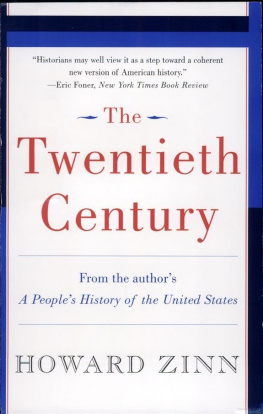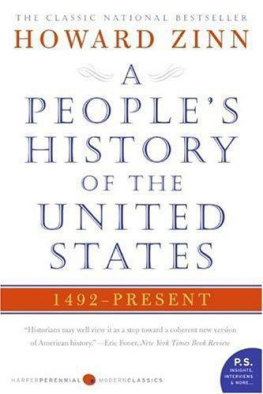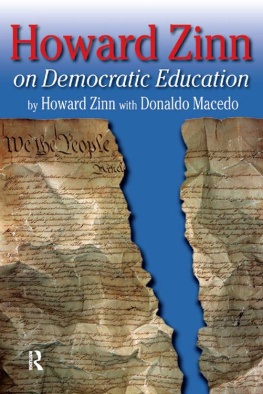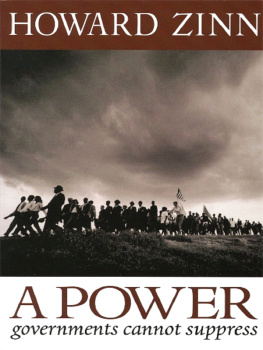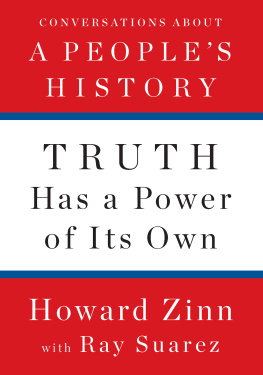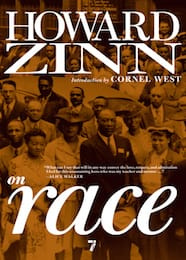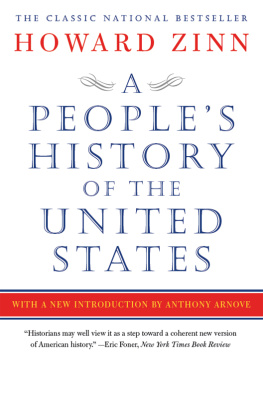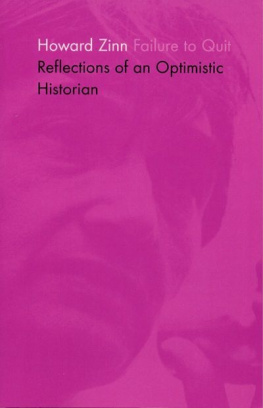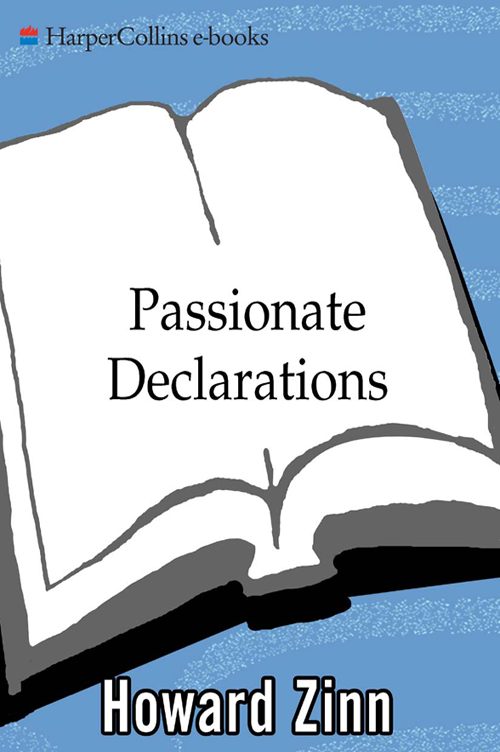W hen this book first appeared, over a decade ago, under the title Declarations of Independence (claiming that the ideas in the book were fiercely independent of authority), the United States was soon to go to war against Iraq. As I write this now, American troops, planes, ships are massing in the Middle East, the nation poised again for war, once more against Iraq.
As always, in a situation of war or near-war, the air becomes filled with patriotic cries for unity against the enemy. What is supposed to be an opposition party declares its loyalty to the president. The major voices in the media, supposed to be independent of government, join the fray.
Immediately after President Bush declared a war on terrorism and told Congress, Either you are with us or you are with the terrorists, television anchorman Dan Rather (to what, I have wondered, is he anchored?) spoke. He said, George Bush is the president. He makes the decisions, and, you know, as just one American, if he wants me to line up, just tell me where. Speaking again to a national television audience, Rather said about Bush: He is our commander in chief. Hes the man now. And we need unity. We need steadiness.
Machiavelli would understand this. Writing in sixteenth-century Florence, his concern is to serve the prince. He does not question the aims of the prince. He cares only to give advice to the prince. He does not question the ends, only the means. The end is national power, and the only question is: what means are best to sustain and extend that power?
As I write this, I hear no voices on high questioning that the end of American foreign policy is to maintain the power of the United States. There are such voices, but they are not in positions of authority, either in government or in the media. Wherever they are, I propose to add my voice to theirs. I want to question the premise of Machiavelli, that one must serve the prince, that the all-important thing is national power, and the only issue is how best to augment it.
Thus, I suggest in the following pages that we think about questions other than the goals of states and statesmen. I want to go beyond Machiavellian obedience and discuss dissent and resistance to foreign policies aiming only at national power.
In my first chapter I tell of those Americans who, despite their positions close to power, decided to speak truth to that power. There were the scientists who spoke out against the dropping of the bombs on Hiroshima and Nagasaki. There were the aides of Henry Kissinger who resigned rather than collaborate in the plans he made with President Nixon to invade Cambodia in 1970. There were Daniel Ellsberg and Anthony Russo, who turned on their old employers at the Rand Corporation and the Department of Defense, and turned over to the public 7,000 pages of top-secret documents exposing government lies about the war in Vietnam. At the close of 2002, Ellsberg called on those in high positions to defy protocol and reveal the secrets kept from the public by a government determined to go to war.
In Violence and Human Nature, I argue against the idea that violence and aggression are inborn, and insist they are determined by culture and indoctrination. I claim that it is possible for people to overcome that indoctrination and act with compassion toward fellow human beings. I now see that claim corroborated in the behavior of some of the families of those who died on September 11, 2001, in the fiery destruction of the Twin Towers in New York City. They reject the idea of retribution, believing we should not react to the terrorism of fanatical groups with the terrorism of war.
In the chapter called The Use and Abuse of History, I ask that history be more than a cold recitation of facts about the past, that it serve a purpose in shaping the future. Traveling the country this past year, speaking against the drive to war on Iraq, I suggested that history might be useful in showing the futility of war as a solution for fundamental problems in international relations. Studying the past, I believe, would reveal the persistence of governmental deceit in luring the nation into armed conflict.
I argue against the idea of a just war. This concept was given powerful credence by the struggle against fascism in World War II. But I believe it is no longer morally acceptable given the technology of modern warfare, in which horrific means are used to achieve uncertain ends. Since I wrote this chapter, the United States has used its armed forces against Panama, Iraq, Yugoslavia, Afghanistan. It may be worth considering whether my arguments against just war fit those situations.
In Law and Justice I question whether obedience to law is morally acceptable when the law protects injustice. I dissect Platos argument for loyalty to the state and place against him the ideas and actions of Thoreau, Gandhi, Tolstoy, Martin Luther King Jr., and many lesser-known practitioners of civil disobedience. In the eighties and nineties, though the war in Vietnam that had produced so much protest was over, groups of Americans in various parts of the country were willing to risk prison by committing symbolic acts of sabotage of nuclear weapons.
The problem of economic justice, which I discuss in Chapter Seven, remains. Indeed, the nineties saw the gap between the rich and the poor grow dramatically. In the ten years before 1998, the annual income of the poorest 20 percent of the population rose by $110, while the annual income of the richest 20 percent rose by $17,800. The average pay of corporate chief executive officers rose to $12 million dollars, while one of every five children was born in poverty.
I want people to have second thoughts on the First Amendment, as I say in one of my chapters, because we grow up naively thinking that the First Amendment guarantees our freedom of speech. I suggest that free speech does not become a reality until people insist on it, struggle for it, practice it, because corporate wealth, governmental power, judicial decisions all limit that right. This is especially true in wartime, and today, the Bush Administration, with the complicity of the Democratic Party, is using its war on terrorism as an excuse to pry into the correspondence, the reading habits, the private life of every American.
I use here the experience of black Americans to show the limitations of representative government, of faith in that much over-praised right to vote to assure us of the equal rights promised in the Declaration of Independence. The skepticism I express in this book has been enhanced by the experience of the last decade, in which the Democratic Party came to resemble the Republican Party more and more. The choice in elections became meaningless as we moved toward the one-party system we have always derided in other countries, and the claim of free elections became ludicrous as the major parties depended more and more on the funds provided by wealthy corporations.


